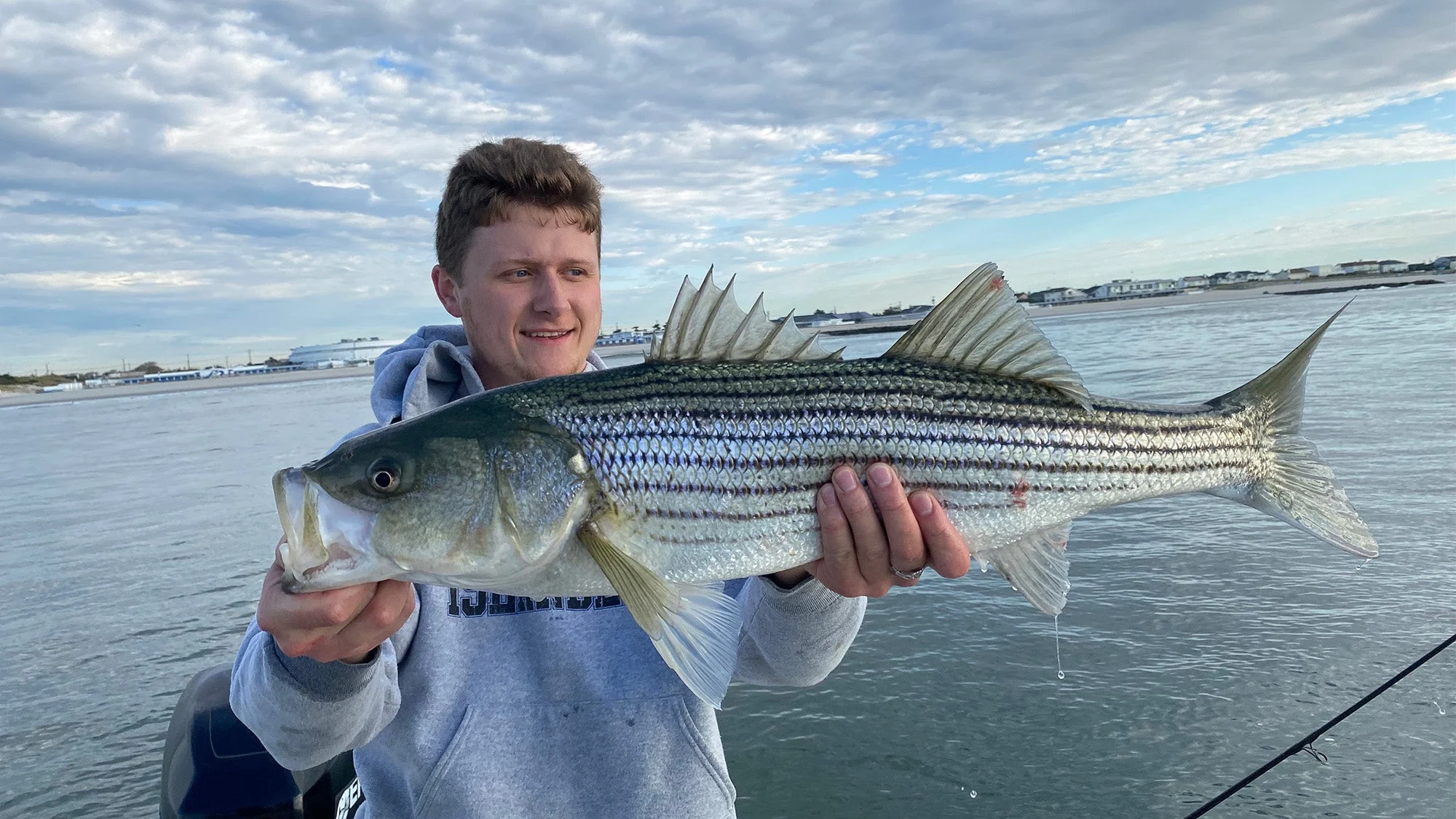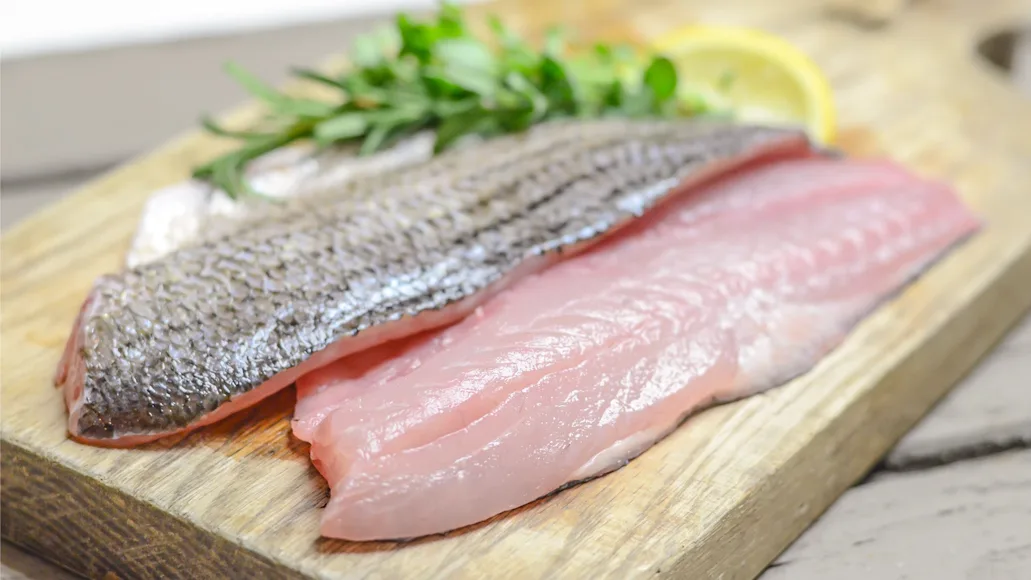Striped bass are not an unlimited resource, and recent slot restrictions
paired with catch and release practices are benefitting populations along the east coast. But we also recognize that striped bass are quite tasty, and a chunky striper that measures within the slot limit can be a perfect seafood dinner. You just need the right striped bass recipes.
Stripers are anadromous, meaning they spend most of their lives in marine habitat
, but enter freshwater to spawn. Additionally, many of the nation’s interior reservoirs, rivers
, and natural lakes host land-locked stripers—the products of nationwide stocking efforts. But wherever these fish roam, they offer firm, mild white fillets yielding tasty meals with a variety of preparations. Here are some of our favorite striped bass recipes and a variety of ways to prepare and cook them.

Field & Stream’s Senior Editor Ryan Chelius with 28-inch striped bass. Ryan Chelius
Preparation
Optimal results start with properly icing your catch and cleaning ASAP. Most agree to remove the dark red “blood meat” that runs laterally through each fillet. There’s a well-defined strip of red stretching from top to bottom, but also look at the skin side (with the skin removed), and you’ll also see that this blood meat unevenly extends past the center strip. Trim all of this red area, or your fillet will have a fishy taste.
While stripers commonly grow well past the 20-pound mark, the smaller fish under 10 pounds usually make the best “eaters.” It is also important to note that saltwater striped bass must measure between 28 and 31 inches to keep. Freshwater striped bass regulations differ from state to state.
B.A.S.S. Conservation Director Gene Gilliland, who spent three decades in fisheries management at the Oklahoma Department of Wildlife Conservation filleted a lot of freshwater stripers, along with white bass and hybrids. Gilliland likes his striped bass fried, and he recently shared his particular process.
Step 1: Cut the fillets into strips about an inch square and 3-4 inches long. Cutting all the pieces as evenly as possible in size and thickness promotes consistent frying. Then, drain on a paper towel to remove excess moisture. This aids in coating adhesion.
Step 2: Mix one 6-ounce jar of yellow mustard with a can or bottle of your favorite beer (warm is best) and stir well. Then, soak fillets in the mustard/beer mixture while preparing the dry mix.
Step 3: Fill your fryer with peanut oil and heat to 375 degrees.
Step 4: The dry mix comprises of yellow corn meal with a splash of cracker crumbs or panko crumbs. Season with salt and cayenne pepper (a little more pepper if the crowd is adventurous). To test the dry mix, dip a finger into the mustard/beer, then dip it into the dry mix, and then lick your finger to taste. Don’t taste-test the dry mix without the mustard base.
Step 5: Mix the dry ingredients in a Better Breader, which helps prevent the mix from clumping on the fillets.
Step 6: Remove fish pieces from the mustard/beer and let them drain to remove excess, then put them in the Better Breader (12-15 pieces at a time). Shake and jiggle the pieces for even coating.
Step 7: Drop coated pieces in hot oil for 3 minutes. Set a timer for precise cooking time. Once the pieces float, remove them and drain on paper towels. As soon as the oil temperature returns to 375, have the next batch of coated fillets ready.
As an alternative to deep frying, Ree Drummond of the Pioneer Woman offers air frying instructions
.

To keep a striped bass in saltwater, it must measure between 28 and 31 inches. Jack Flatley
Other Striped Bass Recipes/Cooking Methods
Frying striped bass is only one method to enjoy your catch. Here are a number of other ways to prepare and cook your striper fillets.
Pan Sear: Soak striper fillets in your favorite marinade. Then heat a frying pan to medium-high with a thin sheen of olive oil; season the fish with sea salt, black pepper, garlic powder, and onion powder. Then cook for 3-5 minutes on each side. If you like crispy edges, raise the heat at the end of your cook and make sure the oil and residual particles do not start singing or smoking. Serve seared fillets with fresh lime.
Blackened: Coat your fillets with your favorite blackening mix, or use a homemade version with paprika, garlic powder, onion powder, thyme, black pepper, cayenne pepper, basil, and oregano. Heat a cast iron skillet to medium-high, dredge your fillets in melted butter, then heavily coat them with your blackening mix. Cook for 2-3 minutes on each side or until you achieve a blackened crust.
Fish Cakes: Mix baked or pan-seared striper meat with panko bread crumbs, egg, finely chopped green onion, and your preferred seasoning. Form into patties about half an inch thick and either pan fry or cook on a flat top griddle. Serve with tartar or remoulade sauce.
Steamed: Northeast striper fisherman Alberto Knie is known for his culinary flair, and when he’s not designing elegant sushi platters, he’ll often prepare steamed striper dinners. His technique: arrange the fillets on a plate with finely chopped ginger and onions, lemon wedges, soy sauce, and vinegar, then place in a steamer for about 7-10 minutes, depending on fillet thickness.
Foil Tent: This technique works in the oven or on the grill. Start by placing striper fillets in a tent made of heavy-duty aluminum foil atop a bed of sliced or diced onions and bell peppers tossed in extra virgin olive oil and balsamic vinegar. Sprinkle with your favorite seasoning, fold over the foil’s top and sides, and loosely crimple before cooking for 10-12 minutes.
Smoked Fish Dip: Set striped bass fillets on a rack smoker and smoke for 4-5 hours at low heat. Shred the cooked meat, and mix with mayonnaise and ranch dressing, sea salt, garlic powder, and black pepper to a desired texture/consistency. For a thicker, richer dip, add softened cream cheese. Serve with crackers and lemon wedges.
Striped Bass Skewers: Cut fillets into even chunks about an inch square and marinate in golden Italian salad dressing or a balsamic vinegar/extra virgin olive oil mix for at least an hour. During the marination, soak wooden skewers in room temperature water to prevent charring. Drain canned pineapple rings (save the juice) and cut into inch-wide pieces. Fill the skewer’s top half by alternating fish and pineapple and cook for 5-7 minutes in the air fryer or over the grill, turning midway. Then mix reserved pineapple juice with teriyaki sauce and brush cooked fish skewers before serving over rice.
Striper Tacos: Grill or pan-sear fillets, roughly chop into bite-size chunks, and stack into soft tortillas (flour tortillas tend to hold up better than corn) over a base of shredded lettuce or red cabbage slaw. Drizzle with garlic/lime aioli, top with pickled red onions, and sprinkle with chopped cilantro.





